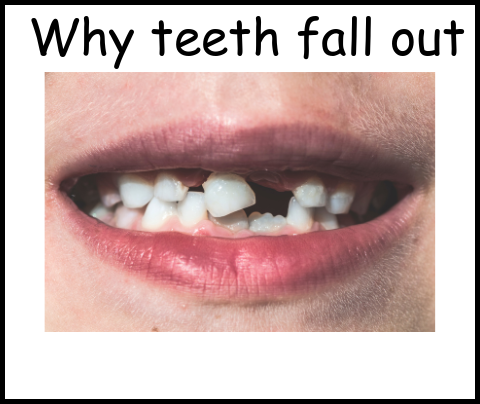Why teeth fall out
Why teeth fall out is a question that many of our patients ask, it’s a serious issue when teeth unexpectedly fall out.
Let’s take a closer look at the causes of teeth falling out, what can be done to prevent this happening and what are the alternatives when teeth are missing.
Your teeth are an integral part of your oral health and their unexpected loss can be a cause for concern.
There are several reasons why teeth might unexpectedly fall out, and it is important to understand these factors in order to properly address the issue.
Let’s explore the most common causes and find answers to why teeth fall out.
1. Gum disease:
The leading cause of tooth loss in adults is periodontal disease, commonly known as gum disease.
This condition occurs when bacteria in plaque builds up along the gum line, causing inflammation and infection.
Over time, if left untreated, gum disease can lead to the destruction of the bone and tissues supporting the teeth, resulting in tooth loss.
2. Tooth decay:
Tooth decay, is a very common reason and one of the top answers to why do teeth fall out.
When tooth decay progresses and reaches the inner layers of the tooth.
It can cause infection and weaken the tooth structure, making it susceptible to falling out.
3. Trauma or injury:
Any form of trauma or injury to the mouth can lead to unexpected tooth loss.
This could be a result of accidents, sports injuries, or even biting down on a hard object.
The impact can cause teeth to fracture, become loose, and is a common enough reason and answer to why do teeth fall out.
4. Bruxism:
Bruxism, or tooth grinding, is a condition where a person unknowingly clenches or grinds their teeth, often during sleep. This constant grinding exerts excessive force on the teeth, which can lead to tooth mobility and potential loss.
5. Genetic factors:
While less common, genetic factors can also play a role in tooth loss.
Some individuals may be predisposed to weaker tooth enamel, which makes their teeth more susceptible to decay and gum disease.
6. Hormonal changes:
Hormonal changes in women, particularly during pregnancy and menopause, can affect oral health.
Increased levels of progesterone and estrogen can lead to gum inflammation, making the gums more vulnerable to infection and tooth loss.
7. Poor oral hygiene:
Neglecting proper oral hygiene practices, such as regular brushing and flossing, can contribute to plaque buildup and the development of dental issues.
Without proper care, tooth decay and gum disease can progress, leading a less common reason and answer to why do teeth fall out.
8. Medical conditions and medications:
Certain medical conditions, such as diabetes and osteoporosis, can affect oral health and increase the risk of tooth loss.
Additionally, some medications, like certain chemotherapy drugs and drugs that reduce saliva production, can contribute to dental problems.
It is important to note that these factors can interact with and exacerbate each other.
For example, gum disease can accelerate tooth decay and vice versa, gum disease is a very common cause and answer to the question of why do teeth fall out.
Regular dental check-ups, maintaining good oral hygiene, and seeking prompt treatment for any dental issues are essential in preventing unexpected tooth loss.
Consult with a professional dentist
If you are experiencing unexpected tooth loss, and are looking for answers to why teeth fall out.
It is best to consult with a dental professional who can examine and discuss your own situation and provide you with a detailed dental plan and treatment options..
What can be done when teeth fall out?
When teeth fall out, it is important to take appropriate actions to ensure dental health and seek professional assistance if necessary.
Here is a detailed explanation of what can be done when teeth fall out:
1. Preserve the Tooth:
If a tooth has been knocked out or fallen out, it is crucial to handle it with care to increase the chances of successful reattachment.
Avoid touching the root and gently rinse it with clean water or milk to remove any debris or dirt.
Do not scrub the tooth or use soaps or chemicals.
2. Reinsertion:
If possible, try to reinsert the tooth gently back into its socket immediately after it falls out. Hold the tooth by the crown (upper part) and slide it into the socket, ensuring it is facing the right way.
Gently bite down on a piece of clean cloth to hold it in place.
Seek emergency dental care as soon as possible to increase the chances of saving the tooth.
3. Store Properly:
If you have the answers to why do teeth fall out and you are in this type of situation and if reinsertion is not possible, store the tooth properly until you can see a dentist.
Place the tooth in a container with milk, saliva, or a specialized tooth preservation solution approved by dental professionals.
Do not let the tooth dry out, as this can cause irreversible damage.
4. Seek Immediate Dental Care:
Regardless of whether the tooth can be reinserted, seek immediate dental care after a tooth has fallen out.
The sooner you see a dentist, the better the chances of saving the tooth or exploring alternative dental options.
5. Pain Relief:
If you experience pain or discomfort after a tooth falls out, over-the-counter pain relievers such as acetaminophen or ibuprofen can help alleviate any pain and reduce inflammation.
Follow the package instructions and consult with a healthcare professional if needed.
6. Evaluate for Emergency Treatment:
In some cases, a fallen tooth may require emergency dental treatment.
This could include avulsed (completely knocked out) permanent teeth, fractured teeth, or injuries to the face or mouth that require immediate attention.
Dental professionals have the necessary skills and resources to handle such emergencies effectively.
7. Consider Dental Implants or Other Restorative Options:
If the tooth cannot be reattached, various restorative options are available to replace the missing tooth.
Dental implants, bridges, and dentures are common solutions and the next step after why teeth fall out.
These options are provided by dental professionals to restore the appearance, function, and overall oral health.
Are implants the only option when teeth fall out
Exploring Alternatives to Dental Implants When Teeth Fall Out
Introduction:
When teeth fall out due to decay, injury, or other dental issues, dental implants are often the go-to solution for restoring function and aesthetics.
However, it is important to know that dental implants are not the only option available.
In this article, we will explore some alternative treatments for replacing missing teeth, considering factors such as cost, durability, and overall effectiveness.
1. Dental Bridges:
Dental bridges serve as an effective alternative to dental implants in certain cases.
A bridge consists of an artificial tooth, referred to as a pontic, which is anchored to neighboring teeth with crowns.
This fixed restoration can be a suitable option when adjacent teeth are healthy and able to support the bridge, providing stability and functionality.
However, it’s worth noting that bridges require the alteration of adjacent teeth to accommodate the crowns.
2. Removable Dentures:
Removable dentures have been a traditional choice for replacing missing teeth.
These prosthetic devices are designed to fit over the gums, supported by suction or adhesive materials.
While dentures are a more affordable option compared to dental implants, they can pose challenges with stability and overall comfort.
Additionally, dentures may require occasional adjustments to maintain a proper fit as the underlying bone structure changes over time.
3. Resin-Bonded Bridges (Maryland bridges):
Resin-bonded bridges, also known as Maryland bridges, are a minimally invasive alternative to traditional dental bridges. Unlike regular bridges,
Maryland bridges are supported by metal or porcelain wings that are bonded to the back of the adjacent teeth.
This method avoids the need to alter healthy teeth significantly.
However, the longevity of resin-bonded bridges may vary, and they are generally recommended for replacing front teeth or in specific cases where the biting force is not too high.
4. Partial Dentures:
Partial dentures are removable prosthetic devices used when several teeth are missing in a single arch.
They are designed to fill the gaps and restore functioning capabilities.
Partial dentures are typically secured to remaining natural teeth using clasps or precision attachments.
While they offer a more affordable option compared to dental implants, it is important to note that they may not provide the same level of stability and chewing efficiency.
5. No Treatment:
In some situations, it may be possible to leave the space created by the missing tooth untreated, especially when it is not causing significant problems with oral function or aesthetics.
However, leaving a gap untreated can lead to several issues in the long term, such as teeth shifting, bone loss, and difficulties with biting and chewing.
Conclusion to why teeth fall out
While dental implants are commonly used to replace missing teeth due to their durability and natural appearance, they are not the only option available following advice on why do teeth fall out.
Dental bridges, removable dentures, resin-bonded bridges, and partial dentures can serve as viable alternatives depending on individual circumstances.
A free consultation with a dental professional is crucial to assess your specific needs and determine the most appropriate treatment option for you.
Remember, it is essential to consult with a dental professional in any situation where a tooth falls out.
They can provide accurate diagnoses, guidance, and appropriate treatments to ensure the best possible outcome for your dental health.
References




